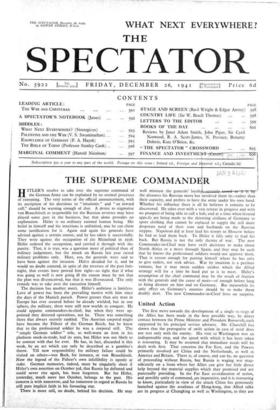JAN 2 81J-1'_
THE SUPREME COMMANDER
HITLER'S resolve to take over the supreme command of the German Army can be explained by no normal processes of reasoning. The very terms of the official announcement, with its ascription of his decisions to " intuitions " and " an inward call," should be warning enough of that. A desire to stigmatise von Brauchitsch as responsible for the Russian reverses may have played some part in the business, but that alone provides no explanation. Hitler is no ordinary rational human being. His belief in himself and his intuitions is unlimited, and he can claim some justification for it. Again and again his generals have advised against a certain course, and he has taken it successfully. They were against the occupation of the Rhineland in 1936. Hitler ordered the occupation, and carried it through with im- punity. That, it is true, was a question more of political than of military judgement, but the attack on Russia last year raised military problems only. Here, too, the generals were said to have been against the invasion. Hitler decided for it, and he would no doubt contend, in spite of the reverses of the past fort- night, that events have proved him right—so right that if what was going so well is now going ill the reason must be not that the plan was ill-conceived, but that it was ill-executed. The only remedy was to take over the execution himself.
The decision has another merit. Hitler's ambition is limitless. Love of power has been the prevailing motive with him since the ,days of the Munich putsch. Power greater than any man in Europe has ever secured before he already wielded, but in one 'sphere, the military, there were still new worlds to conquer. He could appoint commanders-in-chief, but when they were ap- pointed they directed operations, not he. There was something there that always secretly rankled. The Austrian corporal might have become the Fiihrer of the German Reich, but he knew that to the professional soldier he was a corporal still. The " simple German soldier " role, so well-worn an item in his platform stock-in-trade, had its uses, but Hitler was not likely to be content with that for ever. He has, in fact, discarded it this week, by an act which can only be described as a gambler's throw. Till now responsibility for military failure could be visited on others—von Bock, for instance, or von Brauchitsch. Now the legend of the Farm's own infallibility is openly at stake. German memories, indeed, must be singularly short if Hitler's own assertion on October 3rd, that Russia lay defeated and could never rise again, has been forgotten. But for Hitler, yeiterday, much more last October, belongs to the past. His concern is with tomorrow, and for tomorrow in regard to Russia he still puts implicit faith in his favouring star.
There is more still, no doubt, behind his decision. He may well mistrust the generals' loyalt the disasters his Russian move has involved them in—rather than their capacity, and prefers to have the army under his own hand. Whether his influence there is all he believes it remains to be discovered. He takes over with a vast retreat in progress and with no prospect of being able to call a halt, and at a time when fevered appeals are being made to the shivering civilians of Germany to spare clothing that cannot be replaced to supply the still more desperate need of their sons and husbands on the Russian steppes. Napoleon did at least lead his troops to Moscow before he had to lead them back. To Hitler it falls only to lead his back. But Russia is not the only theatre of war. The new Commander-in-Chief may have swift decisions to make about North Africa or a move through Spain, and they may be such that he knows the professional soldiers would not approve them. That is reason enough for putting himself where he has only to give orders, not seek advice. War by intuition is a perilous venture, but it may mean sudden strokes which the Allied strategy will for a time be hard put to it to meet. Hitler's assumption of the chief command may be the result of friction with the generals and the cause of more—of enough before long to bring disaster on him and on Germany. But meanwhile its only effect on Germany's enemies should be to make them doubly alert. The new Commander-in-Chief lives on surprise.






















